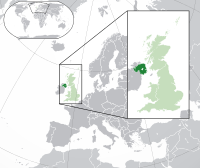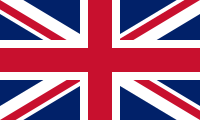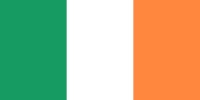Northern Ireland
Northern Ireland is a constituent country of the United Kingdom, and the only country of the UK that is not located on the island of Great Britain. Northern Ireland came into existence as a country of the United Kingdom following the partition of Ireland in 1921.[notes 1] Northern Ireland is also referred to as Ulster, the province of which six of the nine counties are located in Northern Ireland, the remainder in the Republic of Ireland; however, this term carries certain political connotations due to being split between the North and the Republic. Likewise, the Republic of Ireland likes to be referred to as "Ireland", despite the fact that not all of Ireland belongs to the Republic. This also has political connotations.
On two occasions in the Northern Irish parliament, a proposal was made to rename 'Northern Ireland' as 'Ulster'. However, the proposal garnered very little support.
History with Great Britain and partition
Rather than being created the UK accreted. In the same way as the Kingdoms of England and Scotland were united in the 18th century, the Kingdom of Ireland - which comprised the entire island of Ireland - was joined with the Kingdom of Great Britain on January 1, 1801, to create the United Kingdom of Great Britain and Ireland. In the seventeenth and eighteenth centuries Protestants, mainly from Scotland, were lured to the north-western counties, including Counties Donegal, Tyrone, Fermanagh, Coleraine (which is now County Londonderry) and Armagh (Belfast and Counties Antrim and Down were left largely unaffected, having had a less forced and more natural settlement previously. Some of the descendants of the Scottish settlers, and native Ulster people, later immigrated to Appalachia and many Southern US states and settled there - in the US these people are called Scots-Irish, in the UK they are known as Ulster Scots. Some two hundred thousand people settled in the American colonies between about 1715 and 1775 alone.
Throughout the next couple of centuries, several dissatisfied minority groups in Ireland attempted rebellion, with various aims and objectives. At the end of the 18th century, a rebellion was spearheaded in Ulster mostly by Presbyterian liberals. It included Roman Catholics and was called the Society of United Irishmen. Towards the end of the 1800s, spurred on ironically by mostly Anglo-Irish writers and poets, nationalism became adopted by Roman Catholics. The relaxation of Penal Laws against Presbyterians and other Protestant 'non-conformists' meant that Protestants were less interested in the ideas of rebellion or reform. Nationalism therefore became almost solely a Roman Catholic phenomenon. Although still only with a minority support, many nationalists started moving toward the idea of republicanism and full independence, rather than the reforms from within that had previously been desired.
In 1916, again still with only a small support base amongst the general populace, republicans attempted a rebellion now called the Easter Rising. Although repressed, it elicited widespread support from the Irish populace. In the December 1918 general election, United Irish League (Irish nationalist) candidates won 80 of the 105 seats representing Ireland in Westminster. However in Ulster, Unionists, who feared that their rights would not be protected in a predominantly Catholic nation, won 22 of the 37 seats from the province. After a war of national liberation, London caved and agreed to recognize the independence of Dublin. In 1921, Ireland was partitioned into Southern Ireland and Northern Ireland, both of which were constituent countries of the United Kingdom, with the former a figleaf to get on with it. Northern Ireland has since remained a member of the UK.
Ulster
Ulster, one of the four historical provinces of Ireland, consists of the six counties of Northern Ireland plus three in the Republic. When the Free State became a British Dependency in the 1920s (eventually to become the Republic of Ireland), Northern Ireland voted to remain within the United Kingdom. The name is used, mainly by Unionists, as a synonym for Northern Ireland — most notably by the Ulster Unionist Party, paramilitary group the Ulster Freedom Fighters and the Ulster Defence Regiment. This politically loaded usage of Ulster has cast opprobrium over the word in general.
Religion
Christianity is by far the most common religion in Northern Ireland, with the number of non-Catholic denominations together being greater than Catholicism. The UK Census of 2001 puts the number of Roman Catholics in Northern Ireland at 40.2%, with the number of non-Roman Catholic Christians at 45.6%.[1]
The same source puts the number of other or non-religious people at 3% of the population; however, since religion is tied up much more closely with ethnicity in Northern Ireland than in many places (see, e.g., our article on Protestant vs. Catholic atheism), these figures might not represent the actual number of non-believers in the area.
Abortion
Except in very limited situations, abortion was illegal in Northern Ireland until 22 October 2019.[2] Before that date, women could and did travel to other parts of the UK for abortions but had to pay for the procedure as well as travel and accommodation costs. Effectively the poorest women were denied abortions. Pills that induced abortions were readily available online and many women took them even though it was illegal.[3]
Politics
The politics of Northern Ireland can be generally divided between two main ideologies - unionists, who want to retain membership within the United Kingdom, mostly considering themselves British, and nationalists, who wish to secede from the Union and unite with the Republic of Ireland (or, in the case of the very doctrinaire ones, reject the legitimacy of that state in favor of the Irish Republic proclaimed by the 1916 rebels), mostly considering themselves Irish. The religious makeup of these groups is mostly Christian, unionists being largely Protestant and nationalists largely Roman Catholic. Due to this division, it follows that the main parties of Northern Ireland represent one of these two ideological groups; the two main unionist parties are the Democratic Unionist Party and the Ulster Unionist Party, the former currently the largest party in the Northern Ireland assembly and the fourth largest party in the House of Commons. Sinn Féin and the Social Democratic and Labour Party are the two nationalist parties, the former currently the larger while the SDLP enjoyed their popularity throughout the Troubles. The fifth major party, the Alliance Party, is unaligned in the conflict and actively works towards reconciliation. Aw, bless them.
An idea of the divide between nationalists and unionists can be gathered from a speech made by Ulster Unionist Party leader Tom Elliot after winning a seat in the by-election for Fermanagh-South Tyrone. Referring to spectators waving Irish Tricolours - a sign of Irish nationalism in Northern Ireland;
“”I see many people here with flags today, some of them with flags of a foreign nation... I would expect nothing better from the scum of Sinn Féin than to come out like this... their counterparts in the IRA have murdered our citizens, have murdered the citizens of this province for years, for years and decades.
|
| —Tom Elliot, 7th May 2011[4] |
The Troubles
See main article: The Troubles
"The Troubles" refers to a period of conflict between nationalist and loyalist groups in Northern Ireland in the latter half of the 20th century. The issues of both politics and religion concern this particular history of Northern Ireland; the main issues surrounding the Troubles being the constitutional status of Northern Ireland, and the discrimination of largely Catholic nationalists, who wanted a united Ireland separate from the United Kingdom, being discriminated against by the largely Protestant (and otherwise non-Catholic) majority, who wanted Northern Ireland to remain a member country of the UK. There is also a minor third side advocating for a fully independent Northern Ireland, though this has gained little support. Currently, the loyalist DUP controls Northern Ireland, opposed by the nationalist Sinn Féin.
Paramilitary activity since the end of The Troubles
Since the Provisional IRA ceasefire of 1998 a number of Nationalist splinter groups have formed, possibly in homage to the Judean People's Front / People's Front of Judea sketch in Monty Python's Life of Brian, but more likely simply because they enjoy murdering people and didn't want to stop. The amusing names of these new terrorist groups include 'The Real IRA', 'The Continuity IRA', 'The 32 County Sovereignty Committtee' and, most wittily of all, simply just 'The IRA'.
In news media and within political circles these brave freedom fighters are usually referred to as 'dissident Republicans', and their identity is said to be unknown to the authorities. In reality however, they are mostly run by ex-Provisional IRA or INLA splitters (i.e. former colleagues of the current Sinn Féin), directing a new generation of youngsters. Most of their activity consists of shooting police officers, planting bombs that are discovered and defused by the PSNI, beating up or shooting drug dealers and protection racketeering. They function more like an organised crime syndicate than a terrorist group these days and are to Northern Ireland what the Mafia were to New York and Chicago during the Prohibition era.
Despite this they have a rather firm stance against drugs, and if anyone is accused of dealing drugs they are usually issued a warning. If this warning is not heeded they are given a "punishment beating" to dissuade them from continuing. They are ultimately shot in the elbows or knees (and sometimes murdered) if that doesn't work. The amount of evidence needed to determine whether or not to act is minimal and they usually just resort to violence unless the person in question is related to a member of another organisation or related to one. Though they aren't all like this, some of them are involved in the drug trade and they use it to fund their "cause."
Northern Ireland and Palestine
One of the most bizarre aspects of Northern Ireland is its relationship with the Israel/Palestine conflict. Many nationalists view Palestinians as fellow victims of colonial oppression, and have used the Palestinian flag to show their support for them. In response, loyalists have sided with Israel, viewing them as fellow victims of terrorism, and will fly the Israeli flag in support of them.[5] This is very ironic, as some loyalist groups are linked to neo-Nazis.[6] This started in the 1980's, and continues to this day.[7][8] Visitors to Belfast can also see the Italian flag in some places. This is because some people cannot tell the difference between the Irish flag and the Italian flag, for some strange reason.[9]
Brexit
In the Brexit vote, Northern Ireland voted to Remain in the EU, mostly on the Catholic vote. This may or may not lead to reignited sectarian tensions, depending on the details of Brexit and especially whether a "hard border" will be erected and whether the border will lie in the Irish Sea or coterminous with the current NI-ROI border.
See also
Notes
- ↑ Apart from two days in December 1922 when, technically, the rest of the island of Ireland established the Irish Free State, which included Northern Ireland, which immediately opted out.
References
- ↑ http://www.nisranew.nisra.gov.uk/census/Excel/small_sett/ks07a_com_st.xls
- ↑ Rory Carroll, "Northern Ireland Set to legalise Abortion and Same Sex Marriage", The Guardian, 21 October 2019
- ↑ "Why are Northern Ireland's abortion laws different to the rest of the UK?", BBC News Magazine, 8 April 2016
- ↑ Tom Elliot attacks 'Sinn Féin scum' BBC News, 7 May 2011
- ↑ News, Vincent Dowd BBC. "Israel and the Palestinians: The Irish connection". BBC News, 17 June 2010. Retrieved on 30 June 2016.
- ↑ 45antifascist, (25 May 2012). "World In Action - Combat 18 programme 1". Retrieved on 30 June 2016 – via YouTube.
- ↑ Dr. Gordon Ramsey. "Israel, Palestine and Northern Ireland" Northern Ireland Unionist Collective Group Blog (archived 24 Nov 2014 by archive.is)
- ↑ McDonald, Henry (27 August 2000). "Nazi roots of the thugs who threaten peace in N Ireland". The Guardian.
- ↑ "School demands direct apology for Frazer’s flag slur - BelfastTelegraph.co.uk". belfasttelegraph.co.uk. Retrieved on 30 June 2016.




